31 july 2015
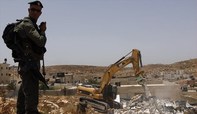
The Israeli occupation army issued orders to demolish a water tank belonging to a UN-funded agricultural project and to freeze the project in al-Karda village, north of the Jordan Valley.
Local sources reported that Israeli soldiers handed those in charge of the project a written order threatening to demolish a tank used for irrigation and ordering them to halt the whole project at the pretext it is located in the Israel-controlled area C.
The UN Development Programme had provided the Karda villagers with a tank to store water as part of a project to develop the agricultural activities in their village.
Local sources reported that Israeli soldiers handed those in charge of the project a written order threatening to demolish a tank used for irrigation and ordering them to halt the whole project at the pretext it is located in the Israel-controlled area C.
The UN Development Programme had provided the Karda villagers with a tank to store water as part of a project to develop the agricultural activities in their village.
26 july 2015
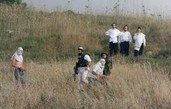
Palestinian villagers and farmers from Salfit have complained that Jewish settlers filled an agricultural water well with dirt and rocks to prevent them from using it to irrigate their lands in Wadi Qana (Qana Valley), west of Deir Istiya town.
Local sources said that the settlers buried the well with mounds of dirt and rocks and fled the scene.
Specialist in settlement affairs Khaled Maali said that the settlers aim to seize the whole area of Wadi Qana and force the famers to leave their lands in order to expand eight settlements encircling the valley.
Maali expressed his belief that there is a kind of coordination between the Israeli occupation army and the settlers in the area to expel the farmers from the valley, where the former bars them from working their lands and the latter harasses them by unleashing pigs into their fields.
Local sources said that the settlers buried the well with mounds of dirt and rocks and fled the scene.
Specialist in settlement affairs Khaled Maali said that the settlers aim to seize the whole area of Wadi Qana and force the famers to leave their lands in order to expand eight settlements encircling the valley.
Maali expressed his belief that there is a kind of coordination between the Israeli occupation army and the settlers in the area to expel the farmers from the valley, where the former bars them from working their lands and the latter harasses them by unleashing pigs into their fields.
24 july 2015
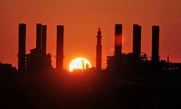
The foundation responsible on water and sewage in Gaza Strip warned of a humanitarian catastrophe due to the shutdown of the sole power station in the blockaded enclave for three days in a row.
The Coastal Municipalities Water Utility (CMWU) said, in a statement on Thursday, “a humanitarian and environmental catastrophe threatens the people of Gaza (1.8 million) due to failure to run water and sewage facilities.
The statement pointed out that the power crisis coincides with the summer season in which water is consumed in large quantities.
It stated that the power crisis caused a water cut off over wide areas in the blockaded enclave in addition to the shutdown of sewage pumps leading to pollution.
Sources of the environment authority in Gaza said 190 water wells, 57 pumps, and 4 sewage treatment plants have been working partially due to power cut off.
CMWU asked the international humanitarian institutions to intervene to solve the crisis and stop a very likely humanitarian and environmental catastrophe in the Strip.
The Coastal Municipalities Water Utility (CMWU) said, in a statement on Thursday, “a humanitarian and environmental catastrophe threatens the people of Gaza (1.8 million) due to failure to run water and sewage facilities.
The statement pointed out that the power crisis coincides with the summer season in which water is consumed in large quantities.
It stated that the power crisis caused a water cut off over wide areas in the blockaded enclave in addition to the shutdown of sewage pumps leading to pollution.
Sources of the environment authority in Gaza said 190 water wells, 57 pumps, and 4 sewage treatment plants have been working partially due to power cut off.
CMWU asked the international humanitarian institutions to intervene to solve the crisis and stop a very likely humanitarian and environmental catastrophe in the Strip.
19 july 2015
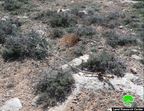
Several fanatic Israeli settlers invaded, on Saturday evening, Palestinian farmlands in the town of al-Khader, south of the West Bank city of Bethlehem, and uprooted hundreds of tomato and cauliflower plants and seedlings, in addition to destroying an entire field planted with Okra.
Ahmad Salah, coordinator of the Popular Committee against the Wall and Settlements in al-Khader, said the Israeli extremists came from the illegal Israeli settlement of Efrat, built on stolen Palestinian lands.
Salah said the assailants invaded more than five Dunams (1.23 Acres) of Palestinian agricultural lands, and uprooted the crops, before running back to their settlement.
The invaded lands belong to three Palestinians identified as Jom’a Salah, Dirar Salah and Samir al-Balboul. Ahmad Salah also stated that the attackers swam in the pool of a local spring, used for both irrigation and drinking.
Ahmad Salah, coordinator of the Popular Committee against the Wall and Settlements in al-Khader, said the Israeli extremists came from the illegal Israeli settlement of Efrat, built on stolen Palestinian lands.
Salah said the assailants invaded more than five Dunams (1.23 Acres) of Palestinian agricultural lands, and uprooted the crops, before running back to their settlement.
The invaded lands belong to three Palestinians identified as Jom’a Salah, Dirar Salah and Samir al-Balboul. Ahmad Salah also stated that the attackers swam in the pool of a local spring, used for both irrigation and drinking.
15 july 2015
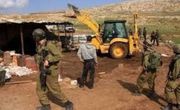
Israeli soldiers invaded, earlier on Wednesday, several Palestinian communities in the West Bank’s Northern Plains, and handed warrants to a number of families, ordering them to halt constructions of their property, in preparation for their demolition.
Had of the Wadi al-Maleh and Bedouin Tribes Local Council Aref Daraghma said several military vehicles, and personnel of the “Civil Administration Office,” run by the military in the occupied West Bank, surrounded the Palestinian communities before invading them.
The soldiers then handed the demolition orders, informing the residents their structures will be demolished this coming November.
Daraghma added that the structures include an agricultural pool of 250 cubic meters, sheds, barns and hothouses.
Earlier Wednesday, dozens of Israeli soldiers invaded, Palestinian communities in the Northern Plains, and conducted live fire military drills in the meadows, and overlooking hills.
Had of the Wadi al-Maleh and Bedouin Tribes Local Council Aref Daraghma said several military vehicles, and personnel of the “Civil Administration Office,” run by the military in the occupied West Bank, surrounded the Palestinian communities before invading them.
The soldiers then handed the demolition orders, informing the residents their structures will be demolished this coming November.
Daraghma added that the structures include an agricultural pool of 250 cubic meters, sheds, barns and hothouses.
Earlier Wednesday, dozens of Israeli soldiers invaded, Palestinian communities in the Northern Plains, and conducted live fire military drills in the meadows, and overlooking hills.
12 july 2015
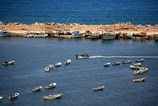
The Land of Peace for Development society on Saturday opened a seawater desalination plant in the Gaza Strip, with funding from a Turkish organization.
The desalination plant was established in al-Shati refugee camp, which is located along the Mediterranean Sea coastline in northern Gaza.
Head of the society Mohamed al-Harrazin told Anadolu news agency that the plant was created to address the problem of the highly saline underground water in Gaza and its negative impact on the lives of the population.
Harrazin added the project was funded by the Turkish organization Rabat and would help provide the Palestinian refugees in al-Shati camp with 25,000 cubic liters of fresh water every day.
The desalination plant was established in al-Shati refugee camp, which is located along the Mediterranean Sea coastline in northern Gaza.
Head of the society Mohamed al-Harrazin told Anadolu news agency that the plant was created to address the problem of the highly saline underground water in Gaza and its negative impact on the lives of the population.
Harrazin added the project was funded by the Turkish organization Rabat and would help provide the Palestinian refugees in al-Shati camp with 25,000 cubic liters of fresh water every day.
2 july 2015

Israeli soldiers invaded, on Thursday at dawn, Yatta town, east of the southern West Bank city of Hebron, and handed demolition orders against a home, and a water well. Soldiers also invaded Beit Ummar, searched homes and summoned two Palestinians.
The soldiers, accompanied by personnel of the “Civil Administration Office,” invaded an area east of Hebron, and uprooted four Dunams (0.98 Acres) of agricultural lands, near Settlement Road #60. The land belongs to Mohammad Mustafa Jaber.
In addition, soldiers invaded the Deerat and Um Sharara areas, east of Yatta town, and handed resident Ahmad Mohammad Salama a demolition order against his home, and a similar order targeting a water well, owned by Ali Ibrahim Mohammad.
Soldiers also invaded Beit Ummar town, north of Hebron, stormed and searched several homes in the al-Baten area, and handed Sultan, 20, and his brother Mohammad Mahmoud ‘Aadi, 18, military warrants for interrogation in the Etzion military and security base.
Also on Thursday, a Palestinian child suffered bruises to her leg, after an Israeli police officer pushed her, and caused her to fall, near the Al-Aqsa Mosque in occupied Jerusalem.
On Wednesday evening, Israeli soldiers invaded the al-‘Eesawiyya town, in Jerusalem, and deliberately caused damage to several cars. The invasion also led to clashes with local youths.
The soldiers, accompanied by personnel of the “Civil Administration Office,” invaded an area east of Hebron, and uprooted four Dunams (0.98 Acres) of agricultural lands, near Settlement Road #60. The land belongs to Mohammad Mustafa Jaber.
In addition, soldiers invaded the Deerat and Um Sharara areas, east of Yatta town, and handed resident Ahmad Mohammad Salama a demolition order against his home, and a similar order targeting a water well, owned by Ali Ibrahim Mohammad.
Soldiers also invaded Beit Ummar town, north of Hebron, stormed and searched several homes in the al-Baten area, and handed Sultan, 20, and his brother Mohammad Mahmoud ‘Aadi, 18, military warrants for interrogation in the Etzion military and security base.
Also on Thursday, a Palestinian child suffered bruises to her leg, after an Israeli police officer pushed her, and caused her to fall, near the Al-Aqsa Mosque in occupied Jerusalem.
On Wednesday evening, Israeli soldiers invaded the al-‘Eesawiyya town, in Jerusalem, and deliberately caused damage to several cars. The invasion also led to clashes with local youths.
24 june 2015
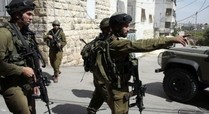
Israeli authorities yesterday handed down an order to Menizel village council, near Hebron city, to halt all building work on pipes and water tanks feeding water into the village.
Coordinator of Popular Resistence Committee, Rateb al-Jabour, told the official agency that the Israeli authorities presented member of the village council, Amad Rashid, with a notice of an order to halt the development of water pipes and tanks around the village.
Villages in the South Hebron hills are faced daily with new legislation, demolition threats and orders notifying owners that development is considered illegal by the occupying powers.
Demolition orders were delivered by Israeli officials yesterday for two tents in al-Mufaqarah village and one house, one tent and one cave in Jawwaya village, according to AIC.
Coordinator of Popular Resistence Committee, Rateb al-Jabour, told the official agency that the Israeli authorities presented member of the village council, Amad Rashid, with a notice of an order to halt the development of water pipes and tanks around the village.
Villages in the South Hebron hills are faced daily with new legislation, demolition threats and orders notifying owners that development is considered illegal by the occupying powers.
Demolition orders were delivered by Israeli officials yesterday for two tents in al-Mufaqarah village and one house, one tent and one cave in Jawwaya village, according to AIC.
10 june 2015
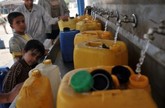
On the occasion of World Water Day 2014, this petition signed by over 12.784 people worldwide including citizens of all EU member states, was delivered to Hannes Swoboda, the President of the Progressive Alliance of Socialists & Democrats in the European Parliament on 20 March 2014.
The petition was handed over by a representative of EWASH, a group of 27 international and national NGOs as well as UN Agencies seeking to improve water, sanitation and hygiene conditions in the occupied Palestinian Territory. Hannes Swoboda, President of the S&D Group, accepted the message and expressed his support for the initiative, noting that “access to water and sanitation is a fundamental human right, which governments and international institutions need to guarantee for everyone”. To see the picture gallery click here.
Please help us achieve 20.000 signatures so we can deliver even stronger message to the decision makers in Europe!
If you have not done so yet, sign our petition by clicking here and ask your family and friends to sign it too.
The petition was handed over by a representative of EWASH, a group of 27 international and national NGOs as well as UN Agencies seeking to improve water, sanitation and hygiene conditions in the occupied Palestinian Territory. Hannes Swoboda, President of the S&D Group, accepted the message and expressed his support for the initiative, noting that “access to water and sanitation is a fundamental human right, which governments and international institutions need to guarantee for everyone”. To see the picture gallery click here.
Please help us achieve 20.000 signatures so we can deliver even stronger message to the decision makers in Europe!
If you have not done so yet, sign our petition by clicking here and ask your family and friends to sign it too.
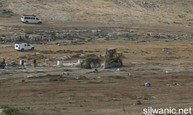
Israeli soldiers invaded, on Wednesday morning, eight Dunams (around 2 acres) of farmland in the al-‘Eesawiyya town, in occupied East Jerusalem, demolished several structures, and uprooted fruit and olive trees.
The Wadi Hilweh Information Center in Silwan (Silwanic) said the soldiers demolished and bulldozed an 8.5 Dunam farm belonging to the sons of the late Sabri Yahia Darwish, and uprooted more than 150 trees. (Olive, Palm, Peach, Cactus, and Pomegranate)
Mohammad Abu al-Hummus of the Follow-up Committee in the al-‘Eesawiyya town, said Israeli bulldozers of the City Council and the “Environment Protection Department,” also demolished a 60 square meter building that includes a kitchen, bathroom, and an indoor planting room, in addition to their water well and the well’s surrounding wall.
Abu al-Hummus said the soldiers did not even show the residents any official demolition order, and prevented them from entering their property.
Resident Adnan Darwish said the family has all official deeds, approved by the Israeli court, and said the destruction even violates Israeli law, as well as international law.
Hani al-’Eesawy of the Land Defense Committee in the al-‘Eesawiyya town, said the attack violated a ruling issues last year, ordering a halt on the construction of the “Talmudic Garden,” located on more than 740 Dunams (184 acres) of lands owned by Palestinians from al-‘Eesawiyya and at-Tour villages.
He added that the Palestinian landowners have been involved in a lengthy legal battle in Israeli courts since Israel announced its plan to build the “garden”, in 2007.
Al-‘Eesawy also said that uprooting the lands, and destroying the Palestinian property, exposed the true nature of the Israeli plan to build a new settlement outpost on Palestinian lands, in order to prevent any Palestinian geographical contiguity.
Raed Abu Ryala of the Follow-Up Committee said the destroyed farm is located within the plot of land Israel has been trying to illegal confiscate to build the garden.
He added that, in September of 2014, the Israeli Regional Construction and Planning Committee ruled that construction could not begin on the “Talmudic Garden” project in at-Tour and al-‘Eesawiyya, but could begin construction in other places outside of the properties in question.
The Palestinian landowners who are losing their land point out that the Israeli confiscation of their land is part of the larger E1 settlement plan that is aimed at the illegal confiscation of large areas of Palestinian lands to complete the chain of illegal settlements around Jerusalem, and the subsequent prevention of any Palestinian geographical contiguity.
The Wadi Hilweh Information Center in Silwan (Silwanic) said the soldiers demolished and bulldozed an 8.5 Dunam farm belonging to the sons of the late Sabri Yahia Darwish, and uprooted more than 150 trees. (Olive, Palm, Peach, Cactus, and Pomegranate)
Mohammad Abu al-Hummus of the Follow-up Committee in the al-‘Eesawiyya town, said Israeli bulldozers of the City Council and the “Environment Protection Department,” also demolished a 60 square meter building that includes a kitchen, bathroom, and an indoor planting room, in addition to their water well and the well’s surrounding wall.
Abu al-Hummus said the soldiers did not even show the residents any official demolition order, and prevented them from entering their property.
Resident Adnan Darwish said the family has all official deeds, approved by the Israeli court, and said the destruction even violates Israeli law, as well as international law.
Hani al-’Eesawy of the Land Defense Committee in the al-‘Eesawiyya town, said the attack violated a ruling issues last year, ordering a halt on the construction of the “Talmudic Garden,” located on more than 740 Dunams (184 acres) of lands owned by Palestinians from al-‘Eesawiyya and at-Tour villages.
He added that the Palestinian landowners have been involved in a lengthy legal battle in Israeli courts since Israel announced its plan to build the “garden”, in 2007.
Al-‘Eesawy also said that uprooting the lands, and destroying the Palestinian property, exposed the true nature of the Israeli plan to build a new settlement outpost on Palestinian lands, in order to prevent any Palestinian geographical contiguity.
Raed Abu Ryala of the Follow-Up Committee said the destroyed farm is located within the plot of land Israel has been trying to illegal confiscate to build the garden.
He added that, in September of 2014, the Israeli Regional Construction and Planning Committee ruled that construction could not begin on the “Talmudic Garden” project in at-Tour and al-‘Eesawiyya, but could begin construction in other places outside of the properties in question.
The Palestinian landowners who are losing their land point out that the Israeli confiscation of their land is part of the larger E1 settlement plan that is aimed at the illegal confiscation of large areas of Palestinian lands to complete the chain of illegal settlements around Jerusalem, and the subsequent prevention of any Palestinian geographical contiguity.

Israeli occupation municipality demolished Wednesday morning Palestinian-owned facilities and bulldozed agricultural lands in occupied Jerusalem and al-Khalil.
Local activist Raed Abu Riala said that the Israeli Nature and Parks Authority destroyed private-owned Palestinian facilities in the town of Issawiya in occupied Jerusalem in favor of the establishment of an Israeli Talmudic garden.
The destroyed facilities include a 30-square-meter room, a water well, a fence, and an agricultural land, he added.
He clarified that the destroyed facilities, that belong to the family of Sabri Yahya Darwis, were initially slated for confiscation as part of an Israeli plan to build a national park in their place known as E1 plan.
The plan, intended to confiscate 740 dunums of private land in Issawiya, was rejected in September 2014 by an Israeli Planning and Zoning committee.
On the other hand, Israeli occupation forces demolished Wednesday morning a tent in Yatta town to the south of al-Khalil without any prior warning.
Local activist Ratib Rajoub said that the Israeli demolition process aims at displacing Palestinians from the outskirts of Yatta town for settlement expansion.
Local activist Raed Abu Riala said that the Israeli Nature and Parks Authority destroyed private-owned Palestinian facilities in the town of Issawiya in occupied Jerusalem in favor of the establishment of an Israeli Talmudic garden.
The destroyed facilities include a 30-square-meter room, a water well, a fence, and an agricultural land, he added.
He clarified that the destroyed facilities, that belong to the family of Sabri Yahya Darwis, were initially slated for confiscation as part of an Israeli plan to build a national park in their place known as E1 plan.
The plan, intended to confiscate 740 dunums of private land in Issawiya, was rejected in September 2014 by an Israeli Planning and Zoning committee.
On the other hand, Israeli occupation forces demolished Wednesday morning a tent in Yatta town to the south of al-Khalil without any prior warning.
Local activist Ratib Rajoub said that the Israeli demolition process aims at displacing Palestinians from the outskirts of Yatta town for settlement expansion.
4 june 2015
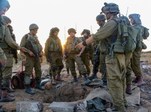
Israeli Occupation Forces (IOF) were deployed on Thursday evening in various locations in Marj Bin Amer to the west of Jenin for searching on water wells.
Local sources revealed that IOF soldiers took photos of the locations and questioned Palestinian farmers while working in their lands in two towns in Jenin.
The Israeli questions were about irrigation sources and locations of water wells, the sources pointed out.
The Israeli authorities consider the artesian water wells as unlicensed while at the same time they refrain from issuing well licenses.
Local sources revealed that IOF soldiers took photos of the locations and questioned Palestinian farmers while working in their lands in two towns in Jenin.
The Israeli questions were about irrigation sources and locations of water wells, the sources pointed out.
The Israeli authorities consider the artesian water wells as unlicensed while at the same time they refrain from issuing well licenses.

Israeli soldiers invaded, on Thursday at dawn, several Palestinian communities in different parts of the occupied West Bank and Jerusalem, stormed and searched dozens of homes and kidnapped at least twelve Palestinians. Soldiers also demolished wells and a wall in a town, near Hebron.
Media sources in occupied Jerusalem said the soldiers invaded homes in the Schools Street, in Jabal al-Mokabber neighborhood, and kidnapped two Palestinians identified as Ahmad ‘Aziz “Oweisat, 23, and ‘Ata Mohammad ‘Oweisat, 43.
Soldiers also kidnapped ‘Ai Sabri Abu Diab, 18 years of age, after invading his home in ‘Ein al-Louza neighborhood, in Silwan town, south of the Al-Aqsa Mosque in Jerusalem.
In addition, soldiers invaded several homes in Silwad town, east of the central West Bank city of Ramallah, and kidnapped Ali Bassem Hamed, 19, and Tareq Naim Hamed, 21. They also searched homes in the town, after surrounding them.
Silwad has been subject to frequent invasions, and arrests that led to the abduction of 18 Palestinians in less than two months, while dozens of residents, including more than ten children, were detained for several hours.
Also in Ramallah, soldiers invaded Deir Ghassana village, northwest of the city, stormed and searched several homes, and handed one resident a military order for interrogation in the ‘Ofer military base.
In addition, a large military force invaded Nahhalin town, west of Bethlehem, and kidnapped three Palestinians identified as Abdul-Karim Mohammad Shakarna, Ismael Osama Shakarna and ‘Ammar Khalil Shakarna.
Soldiers also kidnapped three Palestinians from the southern West Bank city of Hebron, and took them to the Etzion military base.
The three have been identified as Nasr Hussein Abu Hadeed, Mohammad Saleh Mahmoud Abu Turki and his brother Amjad.
Another Palestinian, a college student identified as Yousef Sweity, was kidnapped from his home in Beit ‘Awwa town, west of Hebron.
The army bulldozers also demolished three water wells, and several walls, in addition to uprooting olive and almond trees, in Surif town, northwest of Hebron.
Head of the Surif Local Council Mohammad Lafi said the the demolished wells are vital for agriculture, and that the soldiers also bulldozed dozens of Dunams of farmlands belonging to Ghneimat family, in Sha’ab Seif and Qornet Hadid, west of the town.
On Wednesday at night, soldiers kidnapped a child, identified as Ghaleb Hamed, 15, after stopping him on a roadblock installed on the western entrance of the Silwad. Hamed also holds a U.S. citizenship.
Media sources in occupied Jerusalem said the soldiers invaded homes in the Schools Street, in Jabal al-Mokabber neighborhood, and kidnapped two Palestinians identified as Ahmad ‘Aziz “Oweisat, 23, and ‘Ata Mohammad ‘Oweisat, 43.
Soldiers also kidnapped ‘Ai Sabri Abu Diab, 18 years of age, after invading his home in ‘Ein al-Louza neighborhood, in Silwan town, south of the Al-Aqsa Mosque in Jerusalem.
In addition, soldiers invaded several homes in Silwad town, east of the central West Bank city of Ramallah, and kidnapped Ali Bassem Hamed, 19, and Tareq Naim Hamed, 21. They also searched homes in the town, after surrounding them.
Silwad has been subject to frequent invasions, and arrests that led to the abduction of 18 Palestinians in less than two months, while dozens of residents, including more than ten children, were detained for several hours.
Also in Ramallah, soldiers invaded Deir Ghassana village, northwest of the city, stormed and searched several homes, and handed one resident a military order for interrogation in the ‘Ofer military base.
In addition, a large military force invaded Nahhalin town, west of Bethlehem, and kidnapped three Palestinians identified as Abdul-Karim Mohammad Shakarna, Ismael Osama Shakarna and ‘Ammar Khalil Shakarna.
Soldiers also kidnapped three Palestinians from the southern West Bank city of Hebron, and took them to the Etzion military base.
The three have been identified as Nasr Hussein Abu Hadeed, Mohammad Saleh Mahmoud Abu Turki and his brother Amjad.
Another Palestinian, a college student identified as Yousef Sweity, was kidnapped from his home in Beit ‘Awwa town, west of Hebron.
The army bulldozers also demolished three water wells, and several walls, in addition to uprooting olive and almond trees, in Surif town, northwest of Hebron.
Head of the Surif Local Council Mohammad Lafi said the the demolished wells are vital for agriculture, and that the soldiers also bulldozed dozens of Dunams of farmlands belonging to Ghneimat family, in Sha’ab Seif and Qornet Hadid, west of the town.
On Wednesday at night, soldiers kidnapped a child, identified as Ghaleb Hamed, 15, after stopping him on a roadblock installed on the western entrance of the Silwad. Hamed also holds a U.S. citizenship.
1 june 2015
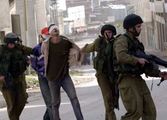
Israeli soldiers kidnapped, on Monday at dawn, nine Palestinians in different parts of the occupied West Bank, including Jerusalem, and handed a family near Jenin an order to demolish their artesian well. One Palestinian was kidnapped on Sunday evening.
Media sources in Bethlehem said several army vehicles invaded Husan town, west of the city, broke into and violently searched several homes and kidnapped three Palestinians.
The kidnapped residents has been identified as Mohammad Jamal Zaghoul, Mohammad Ali Hamamra and Mohammad Ahmad Shousha.
Soldiers also invaded the Balata refugee camp, in the northern West bank city of Nablus, and kidnapped Mohammad Salah Hejazi, 31, after searching his home.
One Palestinian, identified as Sameh Othman Ramadan, from Tal village near Nablus, was kidnapped on Sunday evening on a military roadblock near the village.
In addition, soldiers invaded the Dahia area, in Nablus city, and kidnapped a Palestinian journalist, identified as Ahmad al-Beetawi, 33, after storming his home and searching it.
Also on Monday at dawn, soldiers invaded the northern West Bank city of Jenin, and the Jaba’ nearby town, and kidnapped two Palestinians.
Resident Ghassan al-Atrash, 40 years of age, was kidnapped from his home in the Eastern Neighborhood in Jenin.
The soldiers also invaded and searched the homes of his brothers ‘Ala, Husam and Adnan, in addition to their father’s home.
The soldiers also invaded Ta’nak village, west of Jenin, and handed resident Suleiman Suleiman a military warrant, ordering him to demolish his artesian well, under the pretext of lacking the needed permits.
In Jaba’ town, south of Jenin, soldiers invaded several homes, violently searched them, and kidnapped Amin Emad Kan’aan, 20 years of age.
The soldiers also clashed with local youths, and fired scores of gas bombs and rounds of live ammunition, causing many residents to suffer the effects of tear gas inhalation.
Two more Palestinians were kidnapped from their homes in Silwan town, south of the Al-Aqsa Mosque in occupied East Jerusalem, after the soldiers searched their homes and many other homes in the town.
The two have been identified as Khalil Odeh and Amer al-Abbassi; they were moved to an interrogation facility in the city.
On Monday morning, soldiers installed a roadblock on the main entrance of Beit Ummar town, north of Hebron, and detained several Palestinians while investigating their ID cards and interrogating them.
Media sources in Bethlehem said several army vehicles invaded Husan town, west of the city, broke into and violently searched several homes and kidnapped three Palestinians.
The kidnapped residents has been identified as Mohammad Jamal Zaghoul, Mohammad Ali Hamamra and Mohammad Ahmad Shousha.
Soldiers also invaded the Balata refugee camp, in the northern West bank city of Nablus, and kidnapped Mohammad Salah Hejazi, 31, after searching his home.
One Palestinian, identified as Sameh Othman Ramadan, from Tal village near Nablus, was kidnapped on Sunday evening on a military roadblock near the village.
In addition, soldiers invaded the Dahia area, in Nablus city, and kidnapped a Palestinian journalist, identified as Ahmad al-Beetawi, 33, after storming his home and searching it.
Also on Monday at dawn, soldiers invaded the northern West Bank city of Jenin, and the Jaba’ nearby town, and kidnapped two Palestinians.
Resident Ghassan al-Atrash, 40 years of age, was kidnapped from his home in the Eastern Neighborhood in Jenin.
The soldiers also invaded and searched the homes of his brothers ‘Ala, Husam and Adnan, in addition to their father’s home.
The soldiers also invaded Ta’nak village, west of Jenin, and handed resident Suleiman Suleiman a military warrant, ordering him to demolish his artesian well, under the pretext of lacking the needed permits.
In Jaba’ town, south of Jenin, soldiers invaded several homes, violently searched them, and kidnapped Amin Emad Kan’aan, 20 years of age.
The soldiers also clashed with local youths, and fired scores of gas bombs and rounds of live ammunition, causing many residents to suffer the effects of tear gas inhalation.
Two more Palestinians were kidnapped from their homes in Silwan town, south of the Al-Aqsa Mosque in occupied East Jerusalem, after the soldiers searched their homes and many other homes in the town.
The two have been identified as Khalil Odeh and Amer al-Abbassi; they were moved to an interrogation facility in the city.
On Monday morning, soldiers installed a roadblock on the main entrance of Beit Ummar town, north of Hebron, and detained several Palestinians while investigating their ID cards and interrogating them.
